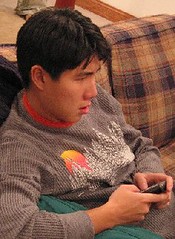Singapore Backlash
A scan of international media reporting.
From across the causeway, The Star's opinion page writes about something that many Singaporeans have felt about the election...
Australia's The Age asks when will LKY die...
Widely-regarded academic journal Dissent publishes an article by university lecturer Daniel A. Bell who experienced greater academic freedom in China than in Singapore.
From across the causeway, The Star's opinion page writes about something that many Singaporeans have felt about the election...
HACKLES RISE OVER PERCEIVED MEDIA BIAS by Siah Chiang Nee (7 May 06)
Singapore’s controlled media has come under criticism for the way it covered the campaign leading to yesterday’s general election.
While Singaporeans were still pondering on which party to give their votes to, many had already cast a negative vote for what they perceived to be biased, lop-sided press coverage.
A frequent charge was that the amount of space and time given by the national press and TV in this election was overwhelmingly in favour of the ruling People’s Action Party (PAP). Some of it was slanted to its favour.
Much of what the opposition candidates did or said, on the other hand, was either ignored or under-reported. There was hardly any mention of figures or photographs of the huge crowds attending their rallies.
Already viewed as underdogs, the struggling candidates may have benefited from a public backlash, a perception that they are victims of media bias.
The Star - Hackles Rise over Perceived Bias
Australia's The Age asks when will LKY die...
SMUTOCRACY IS A FACADE FOR DEMOCRACY by Michael Backman (17 May 06)
WHEN will Lee Kuan Yew die? Sadly, that is the question now on the minds of many Singaporeans. At 82, Lee retains a cabinet post, with the title Minister Mentor, continues to dominate the Government and shows no sign of quitting. But many believe that although he has done much for Singapore, he is now the greatest impediment to reform, and that little can change until after he is gone.
Last week, Lee admonished the younger generation for not fully supporting the People's Action Party at the elections the weekend before. It's a usual claim: young Singaporeans are insufficiently grateful for all that the older PAP leaders have done for them in developing the economy. It's as if a country's progress should be measured only by material comfort. The problem for Lee is that young people in other developed countries have money and freedom of expression. But in Singapore, all they have is money. Young Singaporeans are beginning to see that a gilded cage is a cage, nonetheless.
To combat this growing restiveness, Singapore's Prime Minister Lee Hsien Loong — Lee's son — talks of political regeneration in his efforts to make the PAP appeal to younger people. But it's the same old tricks, if last week's elections are anything to go by. The ruling PAP won two-thirds of the votes. The real surprise is that it didn't win by more, given all the petty restrictions designed to head off opposition.
The Age - Smutocracy is a facade for democracy
Widely-regarded academic journal Dissent publishes an article by university lecturer Daniel A. Bell who experienced greater academic freedom in China than in Singapore.
TEACHING POLITICAL THEORY IN BEIJING by Daniel A. Bell (Dissent Magazine Spring 2006 issue)
The willingness to put up with political constraints depends partly upon one’s history. In my case, I had taught at the National University of Singapore in the early 1990s. There, the head of the department was a member of the ruling People’s Action Party. He was soon replaced by another head, who asked to see my reading lists and informed me that I should teach more communitarianism (the subject of my doctoral thesis) and less John Stuart Mill. Naturally, this made me want to do the opposite. Strange people would show up in my classroom when I spoke about “politically sensitive” topics, such as Karl Marx’s thought. Students would clam up when I used examples from local politics to illustrate arguments. It came as no surprise when my contract was not renewed.
In comparison, China is a paradise of academic freedom. Among colleagues, anything goes (in Singapore, most local colleagues were very guarded when dealing with foreigners). Academic publications are surprisingly free: there aren’t any personal attacks on leaders or open calls for multiparty rule, but particular policies, such as the household registry system, which limits internal mobility, are subject to severe criticism.
Teaching Political Theory in Beijing


1 planning advice given:
At 9:28 PM, Jeremy said…
Jeremy said…
Hi.I saw the twenty sad songs, and was wondering do you have a copy of dick lee's lifestory.I am looking for it now.Please reply me at weiqiang@gmail.com if you have.Thanks.
Post a Comment
<< Home